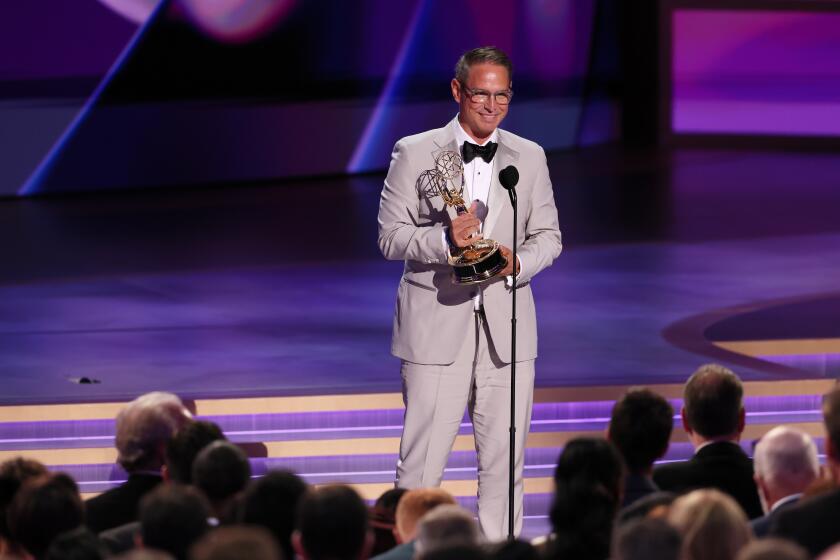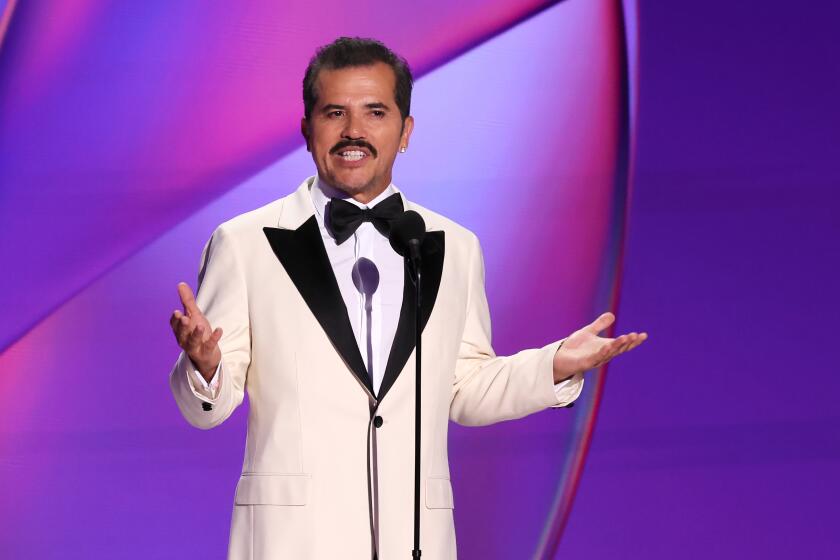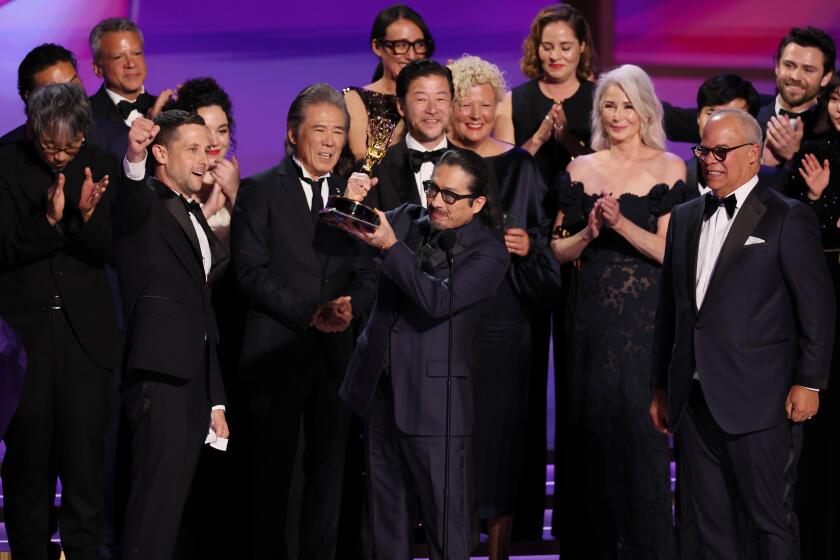Emmy campaigns walk a fine line during writers’ strike
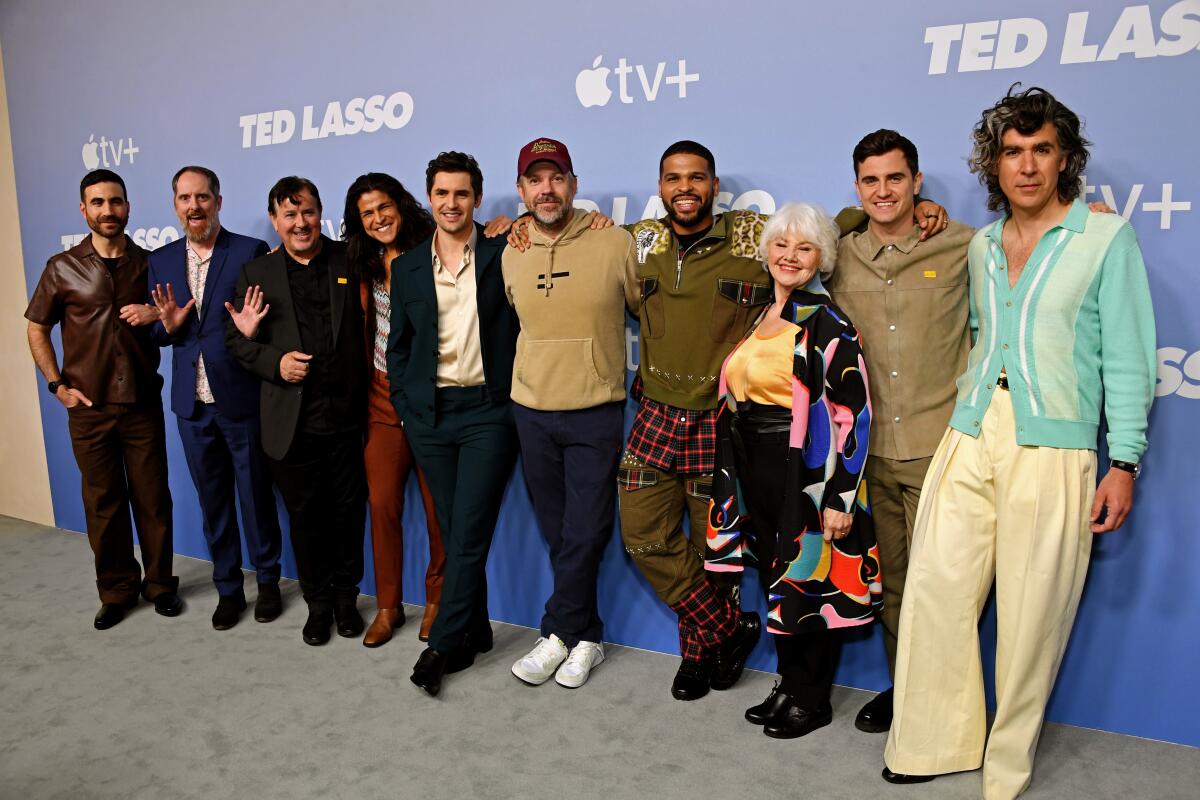
In the few hours between the time when the Writers Guild of America called for a strike May 1 and the labor action began at midnight the next day, Apple TV+ and the “Ted Lasso” team held an Emmys event for Television Academy members at Hollywood’s Goya Studios, where the streamer had carved out a lavish for-your-consideration space.
Emmy voters and Screen Actors Guild members, many sporting AFC Richmond scarves and jerseys, began lining up on Cahuenga Boulevard hours before check-in, eager to see the show’s stars — including Writers Guild members Jason Sudeikis, Brendan Hunt and Brett Goldstein. There would be a costume contest — more than one woman sported a Roy Kent beard — and a trivia battle, during which voice actor Jennifer Roberts somehow beat Sudeikis, possibly because she watched the first season of the show 20 times, calling it a “comfort thing” during the pandemic lockdown.
The onstage vibe during the event’s Q&A portion was, at times, a little bizarre. Sudeikis, sporting a baseball cap and hoodie, shook his head at one point and said, “Shout-out to the writers. What a day to be doing this.” Four days later, he and Hunt were walking the picket line outside Warner Bros., saying they’d be willing to strike as actors as well, if it came to that. (The Screen Actors Guild will soon begin negotiating a new contract. Directors Guild discussions are underway.)
Against a backdrop of picket lines, layoffs and a strike involving roughly 11,500 writers that analysts believe will drag on for months, the 2023 Emmy campaign season has continued, largely uninterrupted. On a recent May weekend, there were nearly a dozen events around Los Angeles, some held in the cavernous stages that studios and streamers have set up for FYC screenings. In New York, HBO unveiled the ninth episode of “Succession” for voters a handful of hours before it aired. There was a reception afterward, but no panel. Since the writers strike began, HBO has pulled the plug on talent participating in any of its Emmy events.
Showrunners, no matter the network or platform, are notably missing. Per the guild’s strike rules, writers are “prohibited from making ... promotional appearances about your work until the strike concludes.” This has led to the cancellation of events for members like Jon Stewart and John Mulaney along with a handful of shows like “Mythic Quest” and “Five Days at Memorial.”
Most FYC fetes, though, have continued as scheduled, even with holes on the Q&A panels. At a celebration on a recent Sunday for the Netflix limited series “Beef,” director Jake Schreier read a statement from the show’s creator, Lee Sung Jin, explaining why he and actor-writer Ali Wong weren’t there. It came complete with scripted pauses for “uncomfortable laughter.”
“It’s awkward out there right now,” one Emmy consultant said of the campaign events. “Understandably, the strike has just sucked all the oxygen out of the room.”
“Everyone’s looking over their shoulders to see what everyone else is doing,” added another awards campaigner. “We all saw it coming, but the reality of it is always very different than the thought of it.”
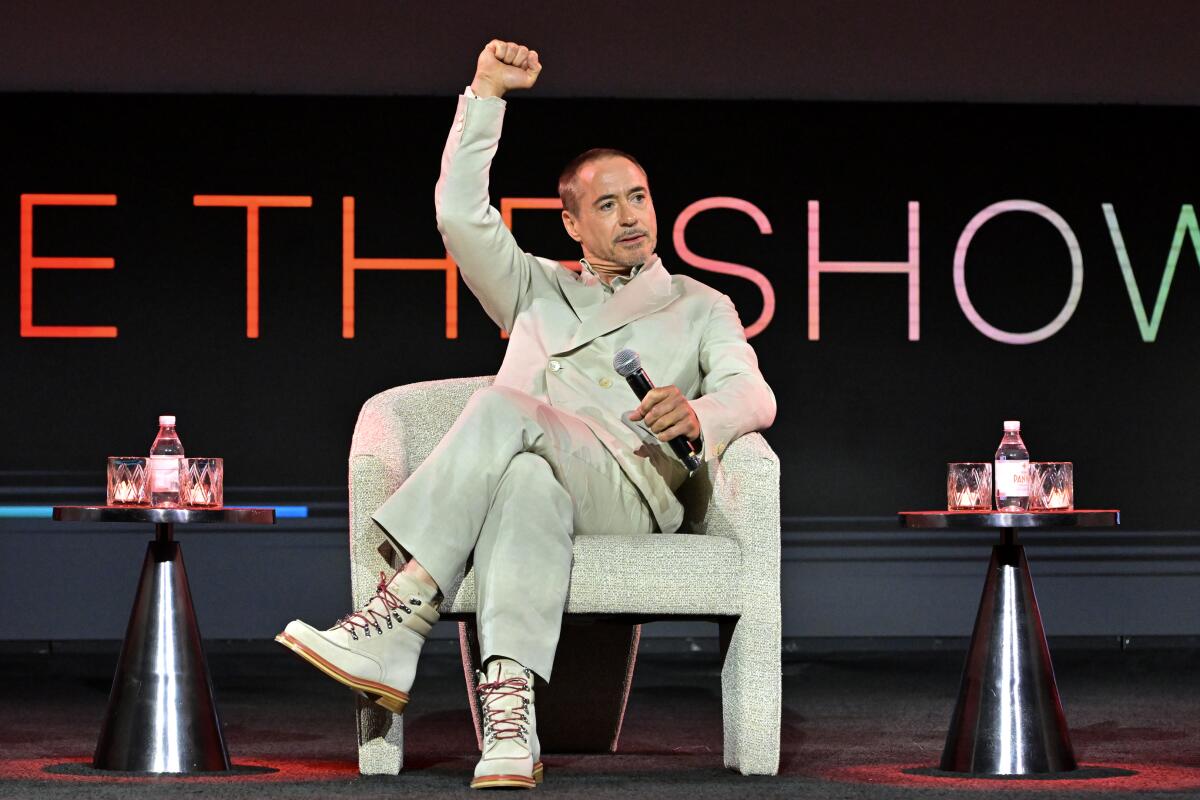
Emmy FYC season isn’t as long as the endless march to the Oscars — but it’s close. The first Emmy events this year, including high-profile evenings for Hulu’s “Welcome to Chippendales” and HBO’s “House of the Dragon,” took place in early March. More than 400 shows contacted the Television Academy inquiring about events this year and by the time nominations voting begins June 15, some 200 events will have taken place.
Given the glut of scripted, reality, documentary and variety programming, Television Academy president and chief operating officer Maury McIntyre said he isn’t surprised by all the interest. Now with the writers strike continuing, the challenge has been to walk the line between celebrating the work and maintaining a tasteful tone.
“We’re hopeful all of these negotiations — WGA, DGA and SAG — are resolved quickly, amicably and equitably,” McIntyre said. “We’re trying to be as respectful as possible. We think it was a terrific year for television. So we really think it’s still worthwhile for us to recognize all the great artists who are out there fighting, making sure they can earn a living.”
Most definitely earning a living right now are the caterers, security and valet teams staffing the massive Emmy spaces around town, an aspect of the season that began in 2017 when Netflix and Amazon Studios redefined campaigning around giving voters experiences — along, of course, with free food and drinks. The Television Academy has around 19,000 voting members, including a core group who dine out on these events four months a year.
Paramount joined the fun this year, opening its first Emmy promotional venue at the Hollywood Athletic Club, complete with a 340-seat screening space and a dozen or so rooms in the two-story building devoted to its various shows. At a recent event for the Showtime limited series “George & Tammy,” guests sipped cocktails (the Stand by Your Manhattan, a play on the Tammy Wynette anthem, was a particular favorite) while wandering through displays for “Yellowstone,” “Yellowjackets” and “Grease: Rise of the Pink Ladies.”
Though the events have still been drawing turn-away crowds, Emmy consultants seem mixed on their efficacy at a time when so many people are out of work.
“I think a noisy campaign could do more harm than good,” one campaigner said, adding that, moving forward through the July nominations and scheduled September ceremony, awards budgets will probably be reduced. “I don’t think it’s a good look to be seen spending millions of dollars on an Emmy campaign right now.”
Then there’s also the question of whether the Emmys will actually happen as planned. The Tony Awards, scheduled for June 11, were initially canceled over fears of picket lines. The Writers Guild of America later reached an agreement with Tony Awards Productions to alter the ceremony, and the show will now go on as planned without any scripted material from writers. That format could be the template for the Emmys should the strike continue through September.
“Does any of it really matter?” one consultant said with a sigh, contemplating the future.
Because awards are meaningless in the face of a conflict that could soon involve actors and directors as well?
“No. Because ‘Succession’ is going to win everything anyway.”
More to Read
From the Oscars to the Emmys.
Get the Envelope newsletter for exclusive awards season coverage, behind-the-scenes stories from the Envelope podcast and columnist Glenn Whipp’s must-read analysis.
You may occasionally receive promotional content from the Los Angeles Times.





